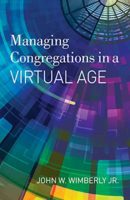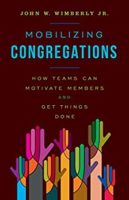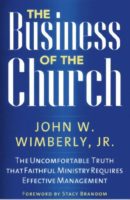
There are lots of ways to look at the past two years of congregational life. Many of the narratives I hear are filled with words like “surviving,” “adapting,” “stressful,” and “unrelenting change.” Today I’d like to talk about another way to view what we are going through: getting ready.
As I researched my latest book, Managing Congregations in a Virtual Age, and talked with clergy across the nation, I heard all the above adjectives describing their experiences. But I also heard story after story of clergy and congregations learning to do things that will prepare them to thrive in the twenty-first century: how to livestream worship, conduct Bible study classes virtually, hold staff meetings on Zoom, and develop online curricula for kids.
Would congregations and clergy have learned these things if they had not been forced upon them by the pandemic? Who knows? My guess is they would have been learned years down the road; perhaps too late to make a difference to the future of the congregation.
With what we learned during the pandemic we are better equipped to deal with many challenges, especially if we recognize these facts about our situation:
1. Religious education will never be the same.
Sunday schools for children and youth have been in slow decline for at least forty years, but nobody wanted to think about alternatives. Sometimes it seemed we only wanted to complain and blame the problem on Sunday soccer matches.
During the pandemic, we found that even without soccer, we still could not force kids and youth to come to classes at a given hour on Sunday. We had to go to them virtually. Many congregations I work with have done this with success— often without knowing much about virtual education. Well, virtual education is no longer a secret—there is more to read about it now than anyone can read. But to succeed in the future, we will need to learn even more. Virtual religious education for kids and youth no longer is the future. It is the present.
2. Meetings will never be the same.
Over too much time to calculate, meetings have become a religious ritual. Sometimes they produced meaningful results, but usually not. Meeting virtually has helped us to refocus meetings on productive work. My consulting practice was totally virtual for approximately 18 months. Reflecting on it, I think the results were better than when I did much of my work face-to-face.
Why are virtual meetings more productive? With the social dimension of meetings greatly reduced, the focus is on productivity: Why are we meeting? What are we supposed to accomplish? These became the most compelling reasons for a meeting. Clearly, social interaction is crucial to the life of a congregation. But we have woven social interaction too deeply into our meeting rituals, at the expense of getting things done. Going forward, most meetings will remain virtual and as a result will focus more on productivity for God’s work in the world.
3. Management of staff and teams will never be the same.
Clergy are not taught to manage. When resources (people, money, buildings) were abundant for congregations, this only led to gross inefficiency. As resources have dwindled over the past fifty years or so, poor management has led to inertia at best, and at worst to wasting precious resources. Clergy and elected leaders of congregations need to learn and implement best management practices now. Tolerating staff people who are unfocused and unproductive is no longer financially viable. Having teams and committees (why are there still committees?) that spend much of their time trying to figure out what they are supposed to do rather than doing something is no longer viable. Clergy and lay leaders need to master the magic of management.
4. Worship attendance probably will not return to pre-pandemic levels.
This is hard for me to write. As a congregational pastor for almost forty years, the first thing I looked at after worship every Sunday was the number of attendees. That number was a guide for growing the church I served. I love inspiring, in-person worship. It lifts my spirit in the way few things do. However, I have concluded that in-person participation may be rooted in my boomer psyche, but not in the human psyche generally. My adult grandkids are as moved watching a movie on Netflix as they would be watching the same movie in a theater. When was the last time they even mentioned going to a movie?
It is not only younger people who prefer a virtual experience. Many people choose to experience things from home, rather than “live and in person.” This is not a COVID-19 thing—it is a trend that was emerging before COVID. The question now is: can congregations create live-streamed worship that is as inspiring as in-person worship? Come to think about it, is this not what televangelists have done for decades? People tune in from home, feel some spiritual growth, and then mail in their checks. We need not to continue live-streaming worship, and we also need to improve it! We must become as skilled the televangelists have been for a long time. If we focus as obsessively on in-person worship attendance as I did, we will be in trouble going forward.
5. Developing the social and relational aspect of congregational life is a huge opportunity.
We are rightly proud of all we learned during the pandemic. However, with so much of ministry gone virtual already, how can we rebuild and sustain the person-to-person relationships that have created such beautiful loyalty between congregations and their members? My points above suggest that in building those relationships, we cannot rely solely on face-to-face religious education experiences, meetings, or even worship. We need to find new, exciting, engaging ways to build community. This should be fun, not work! If we think about it that way, we can reinvent congregational life in awesome ways.
Having learned so much during the pandemic, we are ready to reimagine religious education, build a more productive organization, and improve our live-streamed worship. As we do so, we will find new ways to fill people with faith, hope and love, and to build the sacred ties that bind us together. It is an exciting time to be in ministry!
John Wimberly is an experienced pastor and consultant. As a consultant, he has worked with congregations and judicatories on strategic planning, staff designs for the 21st century, and congregational growth as well as financial and administrative management. He has MBA, MDiv, and PhD (theology) degrees. His books focus on effective management and leadership. John believes congregations can have a bright future!



